Audio Version Of The Blog – 4/5/23
Listen to an Audio Version of the Blog
Download:MP3 Audio

Listen to an Audio Version of the Blog
Download:MP3 Audio

Michael Laitman, On The Times of Israel: “On the Eve of Passover – No Sign of Unity”
Passover is the most festive of all the Jewish holidays. It is a celebration of freedom, when the people of Israel became liberated from the yoke of slavery in Egypt. Back then, the Hebrews united around Moses, and despite internal disagreements, maintained their unity. The reward for their insistence on staying together despite their disputes was not only their freedom, but the declaration of their peoplehood by God.
Today, on the eve of Passover, I am sad to say that we have none of the unity our ancestors had fought for; power struggles reign supreme, and everyone wants to be king. This is a recipe for inviting a modern-day Pharaoh to come and rule over us.
Israel has many enemies. Iran has sworn to destroy it, its proxy terror groups incessantly try to maim it, international movements such as BDS try to cripple its economy, and countries that pretend to be friendly finance anti-Israel movements. Yet, none of these entities pose an existential threat. The only existential threat to Israel is its social division.
Two thousand years ago, we lost our sovereignty due to baseless hatred of each other. For the past two millennia, we have not healed that hatred one bit. If anything, it has only intensified.
Therefore, before we begin to work on “improving” the political situation in Israel, we must understand what it is we must improve. Today, almost everyone takes sides in Israel’s political altercation. Everyone thinks that the country’s deterioration is the other side’s fault.
But the country is not deteriorating because of the Left or because of the Right, if we even know what these words mean today. The country is deteriorating because the Left hates the Right, and vice versa, the secular hate the religious, and the other way around, the rich despise the poor and the poor hate the rich, and the only winner in these—and countless other divisions in Israeli society—is hatred.
Back in Egypt, Pharaoh loved Joseph. He entrusted his entire kingdom in Joseph’s hands, and at that time, the people of Israel were happy in Egypt. When Joseph died, the Israelites became divided and wanted to disperse among the Egyptians. This is when “a new” Pharaoh, who did not know Joseph, arose and began to afflict Israel.
Division also caused the coming of Nebuchadnezzar, who sent Israel to the Babylonian exile. Internal hatred intensified even more during the time of the Second Temple, and brought upon us the Roman general Titus, who destroyed Jerusalem and exiled the relics of the people of Israel in Judah. Even before the onset of the Inquisition, Spanish Judaism experienced an extended period of growing disunity, and the same trend was visible before the rise of Hitler to power.
It is convenient to believe that our enemies appear without cause, but if we ever want to break the vicious circle of periodical expulsions and extinctions, we must begin to search our souls and find where and how we contribute to the empowerment of our haters. If we do so, we will find that our sages have been telling us since the inception of our nationhood that we empower our haters with our hatred of each other.
If we realize that Pharaoh is alive today, governing our hearts and pitching us against each other, enslaving us to his whims and making us think that we are working for ourselves, when in fact we are working for him, then we might choose to follow Moses, the voice of unity within us that says, “No matter how we feel about each other, we are one nation.” It is our choice whom to empower. If we keep empowering Pharaoh, our internal slavery to him will become an external destruction. If we empower Moses and choose unity above all else, our good future is guaranteed.
[311160]
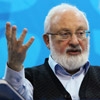 Comment: Arkady writes: “Michael Laitman, you always talk about the heart—feel with your heart, understand with your heart, and hear with your heart. Everyone nods their heads and writes sublime comments, as if they understand. But it is not clear. Tell us, practically, what is a heart that hears, understands, and feels? Otherwise, it resembles philosophy that is completely devoid of life.”
Comment: Arkady writes: “Michael Laitman, you always talk about the heart—feel with your heart, understand with your heart, and hear with your heart. Everyone nods their heads and writes sublime comments, as if they understand. But it is not clear. Tell us, practically, what is a heart that hears, understands, and feels? Otherwise, it resembles philosophy that is completely devoid of life.”
My Response: A heart that understands is aware of everything, feels, and hears; these are connected hearts, nothing more.
Comment: But the human heart has different associations.
My Response: Remove everything preventing their connection with each other, and you will get this common heart.
Question: When you say “heart,” what do you mean? Do you mean desire?
Answer: Yes, desire. Not a pump.
Question: What should my desire become in order to connect with desires of others?
Answer: It could be a pump, when I pump others. I live in order to pump blood, to drive my blood through others. And so does each one through all others.
Question: When you say “blood,” what do you mean?
Answer: Life-giving fluid. This is life.
Question: And when you say “life,” what do you mean?
Answer: Life is a feeling of connection with everyone and the reason for living.
Question: What do we come to when we start living this way?
Answer: We rise above ourselves, live for others, and are connected all together, and then we understand the hearts of all.
Question: Then it will all be like one heart. Besides “heart” can we replace this word?
Answer: No. This is what we are used to and how it is said and written everywhere.
Question: Kabbalists write “heart.” Why the heart and not the mind?
Answer: It is responsible for life. This is where we feel fulfillment, compression, expansion. We live according to this rhythm.
Question: When I say, “My heart is in pain,” what do I mean?
Answer: It is actually shrinking; these are very serious nerve connections. That’s why a person feels more, less; it is the work of the heart. That is why it is so significant.
[310462]
From KabTV’s “News with Dr. Michael Laitman” 2/9/23
Related Material:
The Correction Of “The Stone Heart”
The Heart of the Convention
“What Does My Heart Desire Now?”
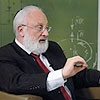 Comment: Your most successful students are those who are receptive to reprogramming. They easily part with a certain firmware and change to another.
Comment: Your most successful students are those who are receptive to reprogramming. They easily part with a certain firmware and change to another.
My Response: Of course; it is very important.
If a person has such natural flexibility, which is not easy to achieve because we go through huge internal transformations; if he is capable of it, is waiting for it, and is in anticipation that it will happen to him often, then he moves forward.
It is like a drug, when you just lose your head and then recover again. The same happens here, only you no longer recover because both in the heart and in the mind there is a serious internal transformation, reconfiguration, and upgrade. But it is wonderful!
At first such a restructuring seems like a strong blow to the head, and then you feel it as something necessary to get closer to the next step. You have to grow up to it.
In this life for several years you go through such transformations that people go through only when they die and are born again. And you can go through it even every day!
Therefore it is said that Kabbalah accelerates and eases development, because it is very difficult to go through such a shake-up, such an internal restructuring, without a group and without studying. After all, normally in order to undergo at least some transformations during life, you need really terrible suffering: illness, death, and to be born again.
[310492]
From KabTV’s “I Got a Call. Laitman’s Confidants“ 10/6/12
Related Material:
Upload of the Spiritual Programs
Accumulation of Emotional and Mental Experience
Internal Restructuring
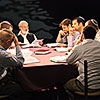 Question: Sometimes you lead the whole group into such states that the students feel it is necessary to make an effort to get out of them. Is this part of your job?
Question: Sometimes you lead the whole group into such states that the students feel it is necessary to make an effort to get out of them. Is this part of your job?
Answer: Of course. This is education! Why else do you need a teacher in Kabbalah? A teacher leads the students through all the most basic steps of entering the upper world, and then they will be able to go further themselves. In our world, we do exactly the same thing with our children; we see them through until they become adults.
Question: During this process, do you experience what you say, or do you just act so that the students feel it?
Answer: No, I experience everything with them. The thing is, I sympathize with them, and I empathize. For me, this empathy is much deeper than theirs. If they do not succeed in something, or something is difficult and incomprehensible for them, I experience it much more than they do. It seems that I am even smiling, but actually I am very worried internally. I am able to survive this because I understand both the entrance and exit from these states and their necessity.
Just like in our world, for example, a child with food poisoning needs to fast. He cries and wants to eat, and his parents suffer from this, but on the other hand, they know they cannot give him food, and they have to wait. Or, for example, they know it is necessary to treat their child’s sore with antiseptic and it will burn, but they do it anyway, and this is not a big deal.
[310543]
From KabTV’s “I Got a Call. Tyrant and Despot” 10/25/12
Related Material:
Problems of Spiritual Growth
Grow Out of “Short Pants”
Teacher And Students
 Question: What happens to a person a moment before the Machsom when two systems are reversed within them?
Question: What happens to a person a moment before the Machsom when two systems are reversed within them?
Answer: There is complete detachment, the feeling of failure, utter hopelessness, and absolute powerlessness, the disappearance of any features, understanding, knowledge, and accumulated experience—just emptiness.
Comment: On the one hand, this is a state where you can easily move away from the usual things and your understanding of the world, but on the other hand, it is very painful to break away from what supposedly is my “I.”
My Response: No. The thing is, you already want it like a person who has suffered a lot before death and wants it. He understands that there is no life in his past qualities anymore, that everything that happened to him is necessary for him to reach the state where he wants to get rid of all of this himself and move on to the next view of the world through the qualities of bestowal and not through the qualities of reception.
[310628]
From KabTV’s “I Got a Call. Perfect Birth” 11/15/12
Related Material:
Breaking Through The Machsom
What Is the Machsom?
Crossing Machsom
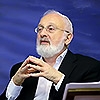 Question: If I received a thought during the lesson that takes me away from spiritual actions, then what do I need to do internally in order to use it correctly?
Question: If I received a thought during the lesson that takes me away from spiritual actions, then what do I need to do internally in order to use it correctly?
Answer: Be grateful that you received the disturbance because there is no evil in the world; there is only good. It depends on how you look at this disturbance.
If you look at it correctly, then you will see that it is good. Every obstacle is placed before you. It is like how we set up some obstacles for small children as exercises.
We do not help him all the time; rather, we give him exercises with which, overcoming them physically, he becomes smarter, and more developed in feelings and in mind. We cannot develop his feelings or mind, so we give him all kinds of disturbances, and various sensations, and constantly bother him. That is how we are also being bothered. Therefore, you need to be thankful, because otherwise, you will remain a small animal.
[310616]
From KabTV’s “I Got a Call. Practical Kabbalah” 11/4/12
Related Material:
Working With Disturbances
Disturbances Are The Creator’s Language
How Can We Fight Heaviness?
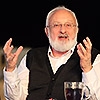 Question: You often repeat: “Why don’t you ask?” But how should we ask? Everyone wants to, but no one understands what they want. Is it some kind of stupid state of hopelessness.
Question: You often repeat: “Why don’t you ask?” But how should we ask? Everyone wants to, but no one understands what they want. Is it some kind of stupid state of hopelessness.
Answer: But why?! Because you do not sense whom to turn to. I understand your problems and I want to direct you correctly.
You do not know whom to turn to. If some kind of a statue were placed in front of you, you would be able to do it.
Once, when I was in Mexico, our bus stopped in a parking lot near a village. There was a statue of the Madonna at the crossroad.
There were many Mexicans among the passengers. People got off the bus. One lame Mexican with a wooden crutch, who had difficulty getting off the bus, approached the Madonna, kissed her, and began to pray. There was something for him to turn to, there was a specific image.
And there are no images in Kabbalah! To what should you turn? To your own corrected self!
Who is the Creator? The property of bestowal and love for others revealed by you.
Kabbalah turns you to yourself. It is impossible for us to understand it! In our minds, this is a terrible dualism, and we cannot do anything about it.
Therefore, Kabbalah is intended only for those who already have this dualism inside them: there is a heart and a point in the heart, i.e., a selfish desire and a germ of altruistic intention. With this, you can move forward and begin to adapt and develop it.
The heart develops, and a point in the heart grows. In other words, two opposite desires develop; there is a dipole that can exchange and grow.
And if there is only a single desire to enjoy, then we need to imagine someone from the outside, not within oneself, but one against the other, and establish one as higher and the other lower, as if this is a created being and this is the Creator.
All this is conditional; there is no creation and no Creator. There are two levels one against the other, and that is it.
And where are you? You are nobody. You exist between these two levels, what we call the middle point of Sefirat Tifferet, Klipat Noga. You exist at this point only in order to realize both levels between which you exist. This is how you develop.
But if there is only one earthly desire in a person, his life, his loved ones, and so on, then he needs some kind of external object to which he will pray, to which he will turn, and on which he will supposedly depend.
In principle, Kabbalah itself sets people up this way. It still comes from ancient Babylon, from Abraham, who gave everyone what they needed: the beginnings of all religions, the beginnings of all beliefs, and the beginnings of Kabbalah. In practice, this is a single knowledge only at different levels.
[310447]
From KabTV’s “I Got a Call. The Most Important Prayer” 10/6/12
Related Material:
Feel Who I Am And Who I Should Be
The Only Prayer
To Whom Should I Pray?
 Michael Laitman, On Quora: “What makes people right-wing and left-wing? How do people who have no political connections become left or right-wing?“
Michael Laitman, On Quora: “What makes people right-wing and left-wing? How do people who have no political connections become left or right-wing?“
Nature consists of two forces: giving and receiving, plus and minus, positive and negative.
We each also host these forces within us. Existence itself requires that a plus has a minus next to it, and vice versa. Such a duality exists on all levels of our lives: material, psychological and spiritual.
As for political right-wing and left-wing inclinations, I would first stay clear of defining them as such because nowadays these terms have become so convoluted that people confuse one for the other.
In its origin, however, a left-wing inclination is more or less toward completion, connection and compromise, while a right-wing approach is its opposite: one of rejection, which defines borders, limitations and boundaries.
Generally speaking, a left-wing approach in its essence is “what’s mine is yours, and what’s yours is yours” while a right-wing approach in its essence is “what’s mine is mine, and what’s yours is mine.”
[311017]
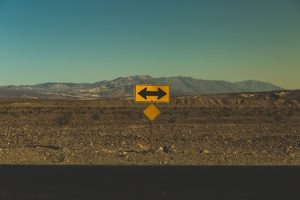
Based on the video “The Nature of Right-Wing and Left-Wing Political Approaches” with Kabbalist Dr. Michael Laitman. Written/edited by students of Kabbalist Dr. Michael Laitman.
Preparation to the Lesson
| [media 1] | [media 2] |
Lesson on the Topic “Pesach (Passover)”
| [media 3] | [media 4] |
Lesson on the Topic “Connecting the World in the Last Generation”
| [media 5] | [media 6] |
Selected Highlights
| [media 7] | [media 8] |